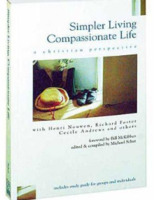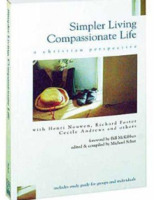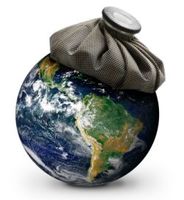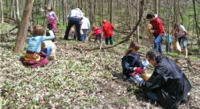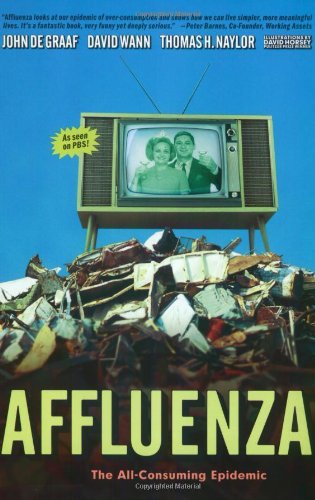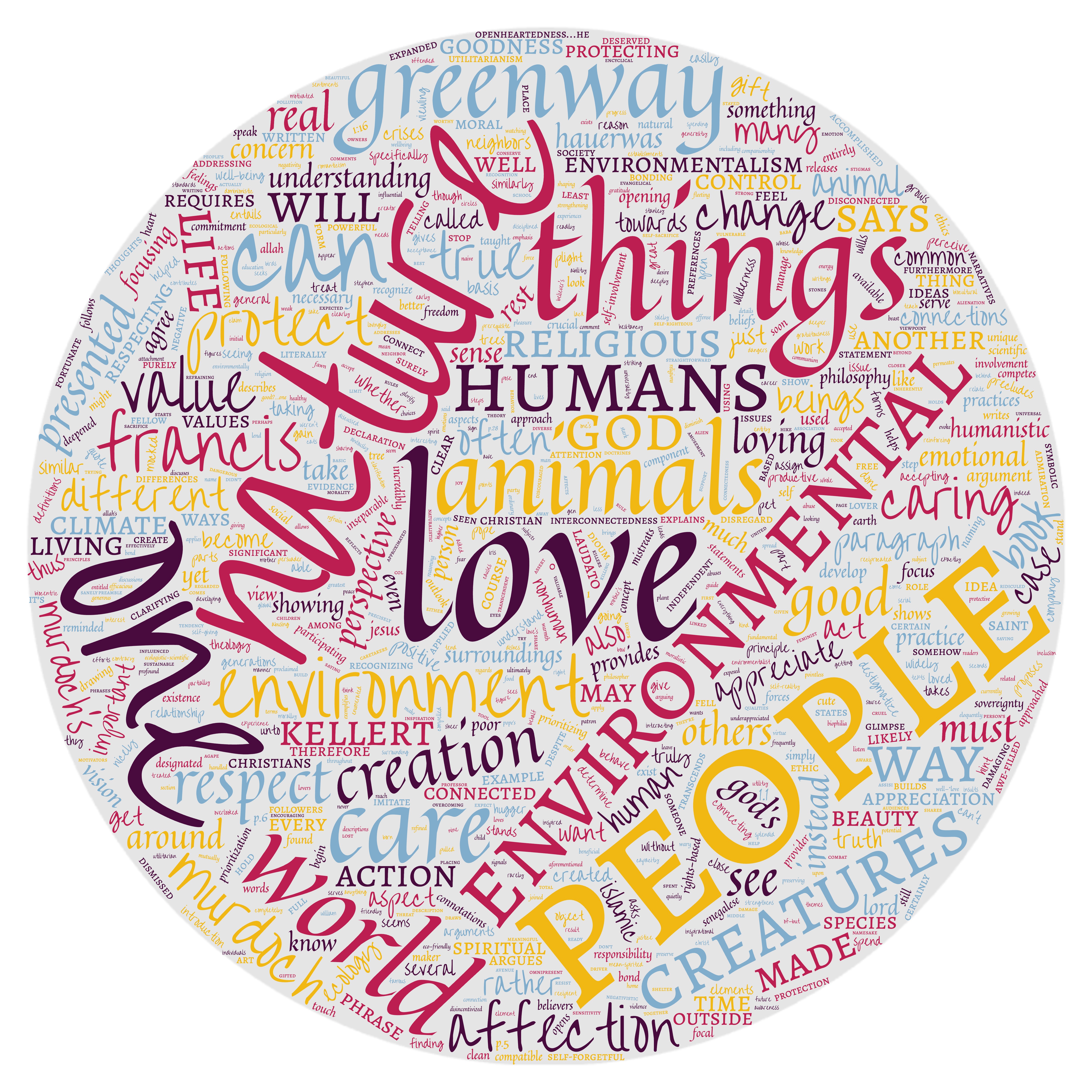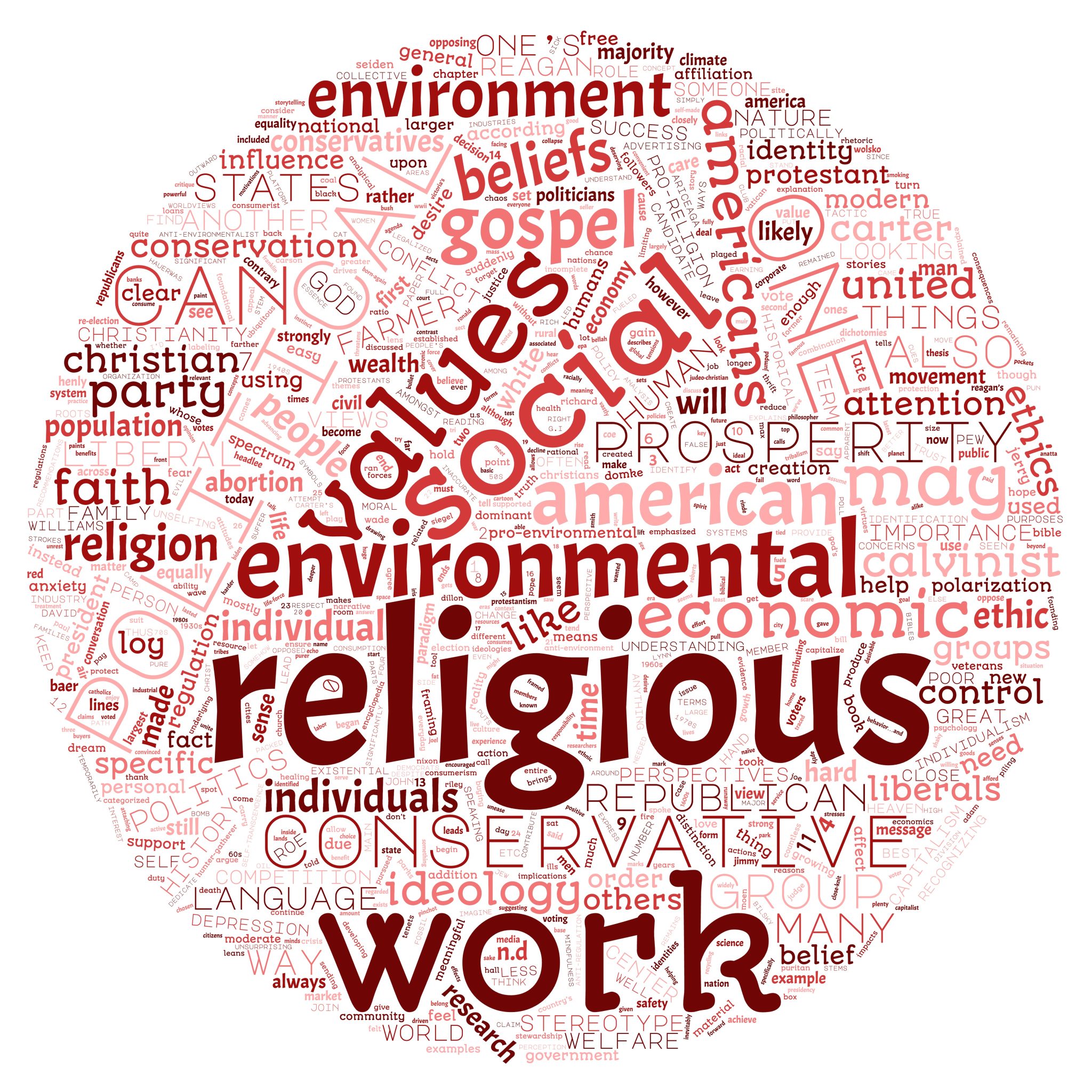Search
72 items
-
"Theology in Support of Simplicity and Eco-Justice" in Simpler Living, Compassionate Life
Simpler Living, Compassionate Life, is a book from Earth Ministries that consists of both essays and community guides regarding humanity’s relationship to our earthly home. This section, "Theology in Support of Simplicity and Eco-Justice," captures the Biblical and faith inspired foundation of the movement toward simplicity. It encourages those who are participants in a culture of over-consumption to reconsider their lifestyles and reverse the damage done to the gift that we have received. -
"Social Structures and the Politics of Simplicity" in Simpler Living, Compassionate Life
Simpler Living, Compassionate Life, is a book from Earth Ministries that consists of both essays and community guides regarding humanity’s relationship to our earthly home. This section, "Social Structures and the Politics of Simplicity," looks at systems in society that perpetuate and encourage over-consumption. From theology to capitalism to advertising, authors call out ways in which we have built our world for destruction. It focuses not only on personal choices, but the necessity of engaged politics and policy. For the full version Moriah Reichert's review of this section of the book, visit the link below. -
Evangelical Environmental Network: The Last Straw
Up to 12 billion tons of plastic trash end up in God’s oceans. Evangelical Environmental Network (EEN) maintains that trash is an affront to the glory of God. Trash eventually ends up someplace, and that someplace belongs to God. In order to put a stop to this waste, EEN has created The Last Straw Campaign Pledge. This pledge urges individuals to decline straws at restaurants and other food/beverage establishments, and avoid purchasing for home use. Additional steps of advocacy that one can take include asking local restaurants to only provide straws when customers request them and asking elected officials at the local and state levels to phase out the use of plastic straws, and single-use plastic. -
Season of Creation Week 1: A Culture of Relationships That Heals our Throwaway Culture
For each week of the Season of Creation, the World Council of Churches offers a resource for celebrating creation. The first week focuses on the throwaway culture that society has created and urges individuals to instead focus on just and sustainable practices. The document includes a call to prayer, a scripture reading, a hymn, and a responsive reflection. -
Columbus Catholic School becomes Designated GreenSpot School
The GreenSpot School designation indicates that a school has taken initiatives to educate their students and staff about sustainability, water issues, conserving energy, reducing waste, and green transportation. St. Mary School Catholic school has become the first in Columbus to earn this designation. They have implemented a recycling program, local garden, and composting, which qualified them to become a GreenSpot School. They have created a short video of students discussing their engagement and staff discussing the impact of becoming a GreenSpot School. -
The Necessity of Environmental Concern
A group of 20 Muslim youths worked to clean up an area in Columbus as a community service event. The event helped one Columbus-area Muslim leader realize that demonstrating concern for the environment is not a luxury, but a necessity. Many people prioritize a number of worldly things ahead of environmental care. Increasingly, faith groups are demonstrating that environmental concern and care needs urgent attention throughout the world. -
Giving Back to the Community on Earth Day 2016
This year on April 22 for Earth Day, many organizations are working in conjunction with Metro Parks Officials to clean up five parks within the Columbus area. Leaders hope to encourage involvement of congregations within local communities. A day of services can be a great teaching moment as well as an opportunity to give back. -
Earth Day statement from ELCA presiding bishop
The Reverend Elizabeth A. Eaton, Presiding Bishop of the Evangelical Lutheran Church in America (ELCA), issued an Earth Day statement on behalf of the ELCA. A salient excerpt from the statement is shown below:
"The effects of the warming climate are felt in nearly every corner of the globe. These include increased migration, food insecurity due to changing agricultural landscapes, national security issues and health problems. As bad as it is for all creation, the most vulnerable people around the world are suffering the most. Yet they have contributed the least and, as noted in the United Nation's 2030 Agenda for Sustainable Development,[iii] are ill equipped to adapt to or mitigate the effects of a changing climate to build resilient communities." -
Climate Change
The Presbyterian Church has put forth this video on care for creation, emphasizing that Christ has called us to go out into the world to care for creation and our fellow humans, especially the poor. The Union of Concerned Scientists has identified food, transportation, and energy as three key areas of focus to help stem climate change Congregations can help by implementing energy saving techniques, participate in recycling and composting waste, teaching children to grow food, and incorporating salient creation care concepts within educational settings. -
Hazardous Waste, Race, and the Environment
This statement was approved by the 207th General Assembly Presbyterian Church (U.S.A.), 1995. The predominant theme focuses on the impact that hazardous waste has on individuals who are suffering from poverty and minority groups. The final section provides suggestions for taking action. -
Climate Change
The World Council of Churches calls individuals to modify their consumer lifestyle for the greater good - to improve shared environmental conditions for all and with less negative impact among the poor. This excerpt provides a sense of urgency to act to reverse the threat of climate change:
"The urgency of the threat of climate change requires our generation to take immediate action and go beyond simple declarations and statements. New alternative models of life are called for. We challenge all people to move towards a style of life that derives its quality from the attentive enjoyment of nature and human relationships, from mutual care, dependence, trust and solidarity instead of the illusions of individual autonomy and material wealth, from spirituality and feelings of community, connectedness and intimacy instead of one-dimensional self-centredness. We draw strength from insights gained from the rich, community- oriented and simple lifestyles of indigenous and other marginalized communities. We are conscious of the significant contribution these communities, with their low carbon economies, deliver to the stabilization of the climate. We recommend the creation of 'just, participatory, sustainable and sustaining communities' for mutual support and call upon the churches and authorities to join them on this journey with reflection and practical support." -
Economic globalization and ecology
In this message, the World Council of Churches (WCC) focuses on how economic globalization affects the environment, with a specific focus on economic justice. The following excerpt provides a succinct summary of what WCC strives to achieve in this area:
"In this context of growing inequality, concentration of power, social exclusion and ecological destruction, people are longing for life with dignity in just and sustainable communities. If that goal is to be attained we need to work for equity as basic fairness that also extends to other life forms, respect for diversity as recognition of the complementary of, for example, cultures species, religious traditions, accountability as a way of being responsible towards one another and Earth itself, participation as the optimal inclusion of all involved, sufficiency as a commitment to meet the basic needs of all, and subsidiarity as determining the most appropriate level for decision-making, supporting the downwards distribution of power." -
Affluenza Documentary (1997)
A one-hour PBS documentary which analogizes materialism and consumption to an epidemic. The term 'affluenza' is a combination of 'affluence' and 'influenza.' This an educational and socially critical piece that discusses the harmful affects of overconsumption, and provides ways to 'treat' it. -
Resources for Affluenza
This is a PBS website dedicated to providing information and resources on overconsumption. It also provides a quiz to asses your consumption quotient, and tips for reducing consumptive behaviors. Lastly, this website has a Teacher's Guide for grades 5-12. This was created in relation to the PBS documentary, Affluenza. -
Sustainable Weddings in Columbus
Weddings are typically large events to celebrate the union of two people. Regardless of how beautiful the celebration is, weddings can still generate a lot of waste. In fact, the average wedding can generate 500 pounds of trash. Recently, there has been a movement to have local sustainable weddings that cut environmental impacts significantly. -
Laudato Si’ in Columbus: Bishop Campbell Regales OSU Students with Historical Overview of Catholic Tradition
Bishop Campbell spoke to OSU students about Laudato Si', specifically regarding how Catholic tradition develops the context for it.
"Bishop Campbell highlighted four themes in his talk, including how Catholicism has considered nature for 2,000 years, a Catholic imagination of nature, historical trends of alienation from nature in the Western world, and a discussion of how sin – light and shadow of the world together – plays a role in our ecological situation."
Please click on the link below to view the entire article. -
Love and Environmentalism
This chapter from the student-written book “Emerging Perspectives on Religion and Environmental Values in America” explores how love and care impact how people interact with the environment, and how spirituality views and impacts this. It discusses how religion encourages love and how love encourages environmentalism, and how the three work together. Below is the first paragraph of the chapter to introduce the discussion.
"My mother had one general rule for me as I was growing up: to respect others, respect myself, and respect the environment. Obviously there were more rules that fell under this— 'clean the dishes after school' being one I was just as frequently reminded of—but they all fell under this principle in some form. This was also the basis of my environmental education: respecting the environment, showing it the care, love and awe that it deserved, was a fundamental aspect of our lives. Every time we would go outside or take a hike, I would be reminded not to touch anything I didn’t have to, to leave things the way I found them, and to appreciate the beauty of our surroundings. These ideas of respecting others and your surroundings are common themes in religious doctrines as well—'love thy neighbor' is a common refrain, and one that is often used in religious environmental arguments. As can be seen in many religious statements on environmental crises, protecting those less fortunate than yourself (respecting others) and protecting the gift of creation (respecting the environment) are the focal points of religious arguments in support of environmental action. Yet the love of nature is often underappreciated or overlooked when it comes to discussions of the environment, despite its universality. Perhaps because the concept is emotional rather than scientific, love is more easily dismissed as a weak persuader, but because it is so basic to humans it stands to be one of the more powerful forces we have available to us. As a common religious and moral value, the love and respect that people are asked to treat their surroundings with is a significant driver in environmentalism, both to better understand the environment and to create a sense of responsibility in preserving it." -
Origins of the Pro-Religion, Anti-Environmentalist Conservative Stereotype
This chapter from the student-written book “Emerging Perspectives on Religion and Environmental Values in America” explores the relationship between political affiliation and environmental values, as well as the stereotypes surrounding them. It examines how religion interacts with political views and the evolution of environmental values thoughout political and religious history. Below is the first paragraph of the chapter to introduce the discussion.
"The conception of someone who is 'anti-environment' usually evokes one of two images: 1) a fat cat in a suit, smoking a cigar while lining the pockets of the fossil fuel industry, or 2) a truck-driving rural American scoffing at the Prius-driving liberals in the cities who preach about their recycling practice. This chapter focuses on the second image...The distinction has been made clear in our minds: liberals care about the environment and conservatives don’t. This, along with another common conception that conservatives are religious while liberals aren’t, paints an inaccurate picture that drives religious conservatives out of the environmental conversation. How did this happen?" -
MLK Day 2024
"ServeOhio Funds 19 Statewide Service Projects Taking Place in celebration of MLK Day
These grants support more than 1,300 volunteers engaging in local community service projects across fifteen Ohio cities
ServeOhio, the Governor-appointed commission on service and volunteerism, announces grant awards to support 19 local Martin Luther King Jr. Day of Service projects throughout January totaling more than $25,000. Much like Dr. King’s legacy, these grants will help nonprofits across the state improve their communities through service and volunteer activities. The grants will fund service projects in fifteen Ohio cities led by more than 1,300 volunteers.
Each project commits to bringing volunteers together to create or improve community assets or infrastructure and supports local community engagement and impact. Additionally, every project includes an education component based on Dr. King’s message of peace, unity, and service to create long-term, sustainable change.
ServeOhio awards these grants with support from the American Electric Power Foundation. Each grant totals between $250 - $1,500." -
Ontario Tech University Sustainability in Art Exhibition
"The Faculty of Social Science and Humanities (FSSH) at Ontario Tech University recently hosted a Juried Art Exhibition with the theme of Sustainability in Art. Artists were invited to interpret sustainability in their own unique ways, resulting in a thought-provoking and inspiring collection.
Due to an overwhelming response, the original plan to select the top ten submissions was expanded to include the top fifteen, who were then invited to bring their art to Charles Hall for the reception event...
First place - Deanna Young for We All Are Part of the Great Circle – $1,250 cash prize
Second place - Camille Augustyn for In Another Dimension – $500 cash prize
Third place - Nuhad Kibria for It’s Not Too Late – $250 cash prize
Three honourable mentions were also awarded to Avery Snelling for Preservation Story Quilt; Katherine Gifford for Nature: Harmonious for Sustainability; and Rebecca Fortin for Wildflowers on Blue." -
A Jewish Response to Environmental Stewardship: LEEDing the Way
The article highlights Temple Israel of Minneapolis's achievement of LEED Gold Certification, reflecting their commitment to sustainability through a multi-year renovation project. This accomplishment aligns with their Jewish values, particularly the principle of Pikuach Nefesh, which emphasizes protecting life and the environment. The synagogue's efforts extend beyond their building to include community-wide initiatives such as climate action resource fairs and partnerships with environmental organizations. Their ongoing commitment to sustainability is showcased through continuous improvements and active participation in broader climate justice movements. -
Pope Francis' Speech on UN World Environment Day
Pope Francis's speech on the United Nations World Environment Day emphasizes the importance of world solidarity to counter what he deems a current culture of waste. One prevailing message is the danger of consumerism. The pope extends a challenges to forgo excessive wealth in exchange for living a more simplistic lifestyle, which can help combat world health and hunger issues. -
ISNA Green Initiative
The “ISNA Green Initiative” was formed in December of 2014 as one initiative for the Islamic Society of North America (ISNA). The group aims to raise awareness of issues concerning the protection and conservation of the environment, as well as promote a sense of urgency with regard to the catastrophic effects of climate change.
The ISNA Green Initiative Team has created a myriad of ways to promote environmental social justice within the Muslim community. The group has developed standards for transforming Masajid into environmentally friendly places of worship and promoting standards for building Masjid that meet the standards of green architecture. One example of their educational programming includes the promotion of the practice of a “Green Ramadan,” designed to reduce waste, conserve resources, and reduce the use of harmful products such as plastic water bottles and styrofoam. Another example includes promoting the use of solar energy to reduce the use of fossil fuels. -
Ancient Judean Dates
A date tree planted in Ketura, Israel from 2000 year old seeds found at an archeological site in the Judean wilderness has finally bore fruit earlier this month (September 2020). The harvest was hailed a modern miracle of science. “In these troubled times of climate change, pollution and species dying out at alarming rates, to bring something back to life from dormancy is so symbolic,”... Date palms were praised in the Bible and the Quran, and became symbols of beauty, precious shade and succulent plenty. -
Engaged Organizations: Global Oneness Project
The Global Oneness Project was founded in 2006 as an initiative of Kalliopeia Foundation, and is focused on education aimed a planting seeds of empathy, resilience, and a sacred relationship to our planet. They are passionate about the power of stories and offer a rich library of multimedia stories comprised of award-winning films, photo essays, and essays as well as companion curriculum and discussion guides focused on world culture, social justice and sustainability.

